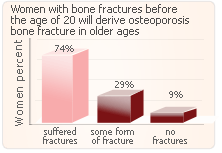
As women reach menopausal age low estrogen levels can cause the bones to weaken drastically and many women will suffer from fractures as a result, post menopause. Hormone replacement therapy is one treatment which has been found to stem this type of aging, however research has also shown that if a woman has a history of bone fracture, post menopause, the risk of future fractures is significantly higher, whether or the woman is undergoing hormone replacement therapy. Until now it has been unclear as to whether fractures between the ages of 20 and 50 also increase the risk of fractures after menopause.
Research carried out in 2002 sort to find out if there was a link between fractures from the ages of 20 to 50 and the increased risk of bone fractures post menopause. A group of 1284 women from Auckland, New Zealand took part in this cross-sectional study. The women had a mean age of 74 and all involved were at least 10 years post menopausal. Detailed questionnaires recorded the medical history of the patients, including their fracture history, osteoporosis diagnosis and history of hormone replacement therapy use.

The results of this survey show that while fractures obtained before the age of 20, reported by nine percent of the subjects, did not have a notable effect on the risk of fractures with osteoporosis. However, there was a notable increase in risk with women who had suffered from fractures between the ages of 20 to 50. Seven percent of the women recorded fractures from the ages of 20 and 50 while 29% of the women had suffered from some form of bone fracture during or after menopause. With these results researchers recorded an increased risk of 74% in those women who had had fractures earlier in their lives when compared with those who had not. Researchers were also keen to stress that age, maternal history of hip fractures, age at menopause, weight, history of hormone replacement therapy, osteoporosis diagnosis and smoking and alcohol histories were taken into consideration during this study with multivariate analysis.
These results are important for women at a higher risk of bone fracture as they enter menopause as it demonstrated that they should make appropriate lifestyle changes and introduce treatments to try and reduce the risk of future fracture. Hormone replacement therapy is one treatment which is known to reduce the likelihood of fracture, however such hormone replacement therapy can cause other dangerous side effects which mean it can only be taken for short periods of time. It's important for at risk women taking hormone replacement therapy to be extra vigilant as they stop this treatment, as bone fractures risk increases dramatically.